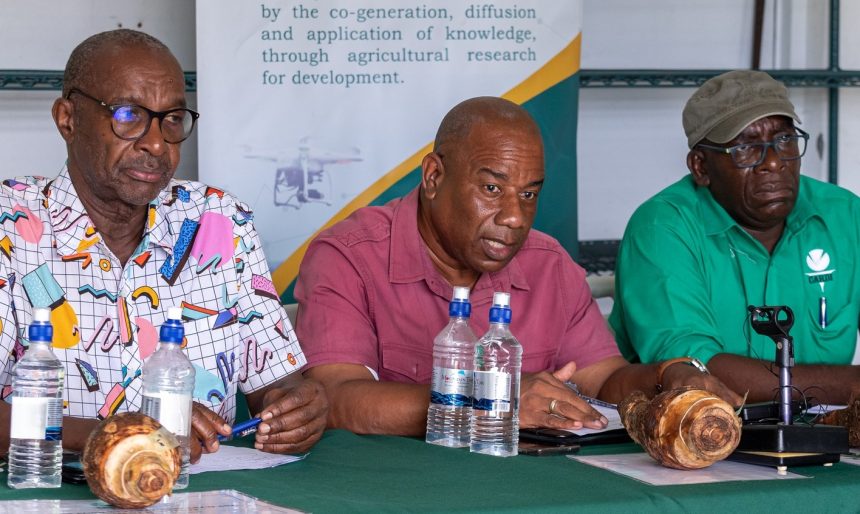A handing-over ceremony was held at the Montreal Greenhouse Park, where several boxes of dasheen were donated to the Ministry of Agriculture, health institutions, the Lewis Punnett Home, His Majesty’s Prison and persons impacted by Hurricane Beryl.
The Dasheen Post-Harvest Trial is being executed by the Caribbean Agricultural Research and Development Institute (CARDI) in collaboration with the Eastern Caribbean Trading Agriculture Development Organisation (ECTAD) and the Ministry of Agriculture, with funding from the Committee Linking Entrepreneurship-Agriculture-Development (COLEAD) organisation.
The trial is aimed at examining the effectiveness of two biological fungicides (Lime Sulphur and Serenade) against Ridomil, a banned fungicide in France, to control post-harvest pathogens, namely, bacteria and fungi.
According to CARDI’s SVG representative, Mr. Donawa Jackson, both Ridomil Gold and lime sulphur were effective in preserving dasheen during shipment to the United Kingdom (20–25 days) and for several weeks afterwards. However, he noted that although lime sulphur initially showed promising results, the most recent shipments to Europe experienced some spoilage. This has highlighted the need for further studies to determine whether adjusting dosages could provide more reliable control.
Director of ECTAD, Mr. Jethro Greene, emphasised the need for continuous research, long-term planning, and a shift toward organic treatments to meet changing market standards and reduce dependence on chemicals. “We made mistakes with bananas, and we must not repeat them with other crops,”.
Chief Agricultural Officer, Mr. Renato Gumbs, highlighted the importance of advancing the regional agriculture through collaborative efforts. Mr. Gumbs emphasised the need for a coordinated approach through research institutions can strengthen the region’s research agenda, attract funding, and ensure more effective outcomes.
Agricultural Extension Officer, Ms. Catherine Bonadie-John, hailed the post-harvest dasheen trial a groundbreaking step, highlighting dasheen’s strong potential as one of SVG’s top export crops. She added that the results go beyond solving storage issues, showing a wider commitment to sustainable practices and practical solutions that support farmers, exporters, and consumers.
The post-harvest trials began on July 13th, 2025. During that time, the Ministry of Agriculture personnel from the Plant Protection and Quarantine Unit and the Head of Extension and Advisory Services assisted with post-harvest data collection. The final data entry was conducted on August 13th, 2025.


